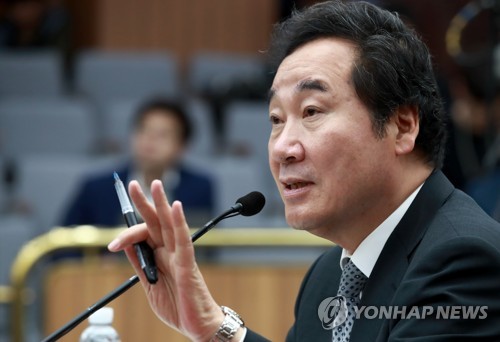Prime Minister-nominee Lee Nak-yon was grilled Thursday over his policy orientations, leadership credentials and ethical issues during the last session of the two-day parliamentary confirmation hearing.
Opposition lawmakers bombarded him with pointed questions about allegations against his family members, but many others zeroed in on his stances on key policy issues to see whether he is fit to take the government's No. 2 post at a time of security and economic challenges.
The opposition-led National Assembly is set to adopt a report on the results of the hearing Friday. Major political parties have agreed to vote on Lee at a plenary session next Monday at the earliest.
Lee's appointment requires consent from a majority of the 299 lawmakers. The ruling Democratic Party has 120 seats, while the main opposition Liberty Korea Party (LKP) and its splinter Bareun Party control 107 seats and 20 seats, respectively.
Asked about the ongoing dispute over whether the installation of a U.S. missile defense battery in South Korea needs parliamentary ratification, Lee said that "consent" from the legislature is needed to secure "procedural legitimacy" for the deployment.
But he pointed out that consent does not necessarily mean parliamentary ratification -- an indication that it could be secured through a political settlement without the legislature's formal vote on it.
Lee also noted that President Moon Jae-in and his Chinese counterpart Xi Jinping may seek to address the issue of Beijing's apparent economic retaliation for the installation of a Terminal High Altitude Area Defense (THAAD) battery during their summits that could come in the coming months.
"There is a possibility that the two sides will hold summits at least once or two times by August," Lee said. "(I hope) we can capitalize on the opportunities ... and see some fruitful results during the summits."

On the issue of asking Washington to redeploy tactical nuclear arms to the peninsula, Lee gave a negative answer.
"If we have tactical nuclear arms redeployed, our rationale to demand Pyongyang's denuclearization will evaporate," he said.
Amid escalating nuclear threats, some conservatives called for the redeployment of U.S. tactical nuclear arms that were withdrawn from the peninsula following an inter-Korean denuclearization declaration in the early 1990s.
Touching on the issue of big conglomerates encroaching on business realms deemed more suited for small firms, the nominee made a "plea" against any practices that would hurt minor enterprises.
"(I call on the leaders of big conglomerates) to compete on the broader global stage rather than coming into the small alleys," Lee said.
During the hearing, Lee expressed his support for the abolition of the death penalty. When asked about abortion, the nominee said he cannot ignore women's "right of choice," though he wants abortions to not occur.
On the issue of sexual minorities, he said that society should keep a more inclusive attitude, and that there must not be any discrimination based on individuals' sexual orientation. But he expressed skepticism about the legalization of same-sex marriage.
Some lawmakers focused on a series of allegations about his family members. They ranged from his son's exemption from military service to his artist wife's sale of paintings to a public firm at unusually high prices and his mother's suspected real estate speculation. Lee has denied most of the allegations. (Yonhap)

